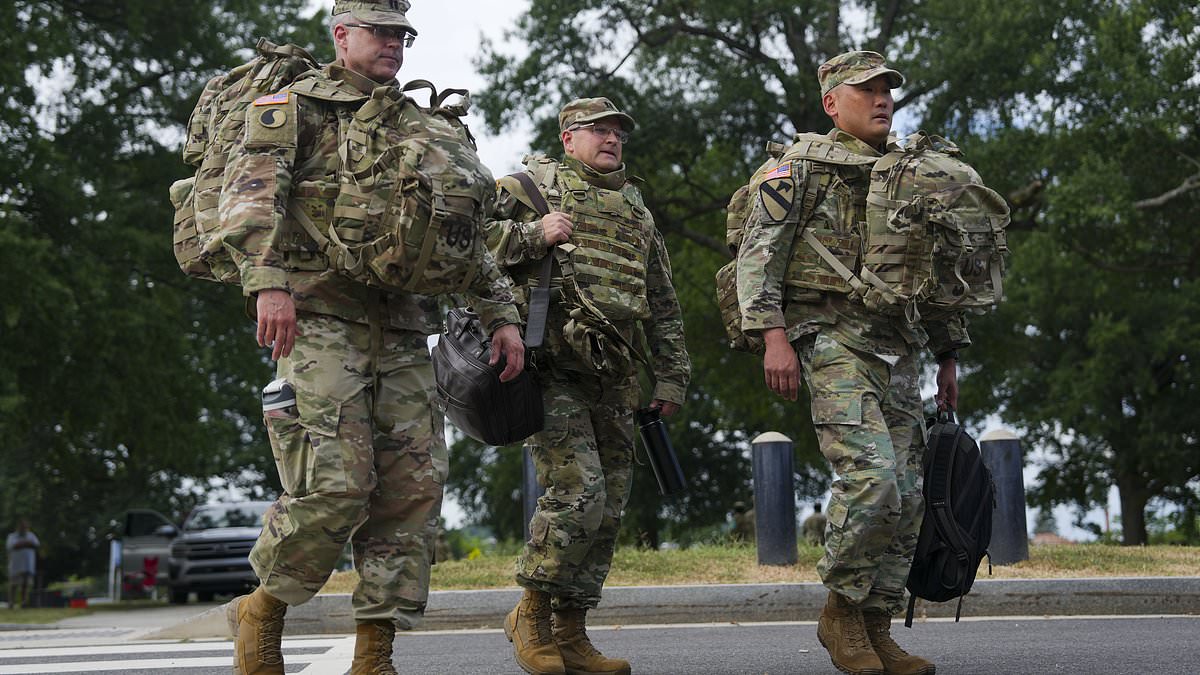In a bold and controversial move, the streets of Washington DC saw an unusual military presence Tuesday night as National Guard troops began patrolling the city.
This action came shortly after former President Donald Trump announced that the federal government would step in to take control of policing in the nation’s capital, aiming to tackle rising violent crime.
Nighttime Deployment Sparks Visible Military Presence
Starting around 8 p.m. Eastern Time, images surfaced showing camouflaged National Guard soldiers dispersing throughout various parts of the city.
Military Humvees were parked prominently on the National Mall, with troops standing guard nearby.
According to reports, this military presence lasted for about two hours, described by a nearby Master Sergeant as a “presence patrol” intended to deter crime and reassure residents.
Arrests Made as Authorities Crack Down
The FBI Director, Kash Patel, shared on his social media platform X that at least 23 arrests had been made with help from various law enforcement partners.
Among those taken into custody were individuals charged previously with murder, unlawful possession of firearms, outstanding DUI warrants, and violations of restraining orders.
Patel expressed confidence that giving law enforcement officers more freedom to act aggressively could quickly improve safety in the city.
White House Details Scope of Law Enforcement Action
White House Press Secretary Karoline Leavitt revealed that approximately 850 officers and agents were deployed across Washington DC starting Monday, making a series of arrests in their effort to “rescue” the capital from what Trump described as “crime, bloodshed, bedlam, and squalor.”
The president, flanked by senior officials including Attorney General Pam Bondi and FBI Director Kash Patel, promised a tough stance against the city’s worst offenders.
Trump’s Hardline Message on Crime and Homelessness
President Trump’s remarks left no doubt about his administration’s approach.
“You spit and we hit—and we can hit real hard,” he said, signaling an aggressive crackdown.
He also vowed to clear homeless encampments from public parks and lands in the city, linking them to broader issues of crime and disorder.
Highlighting Recent Violence in the Capital
Trump pointed to a series of shocking violent incidents to justify the federal intervention.
These included the fatal shooting of a 21-year-old congressional intern by a stray bullet in a drive-by shooting, the murder of a former Trump official during a carjacking, and a Democratic congressman who was carjacked at gunpoint.
He also recalled a stabbing of a senator’s aide in 2023 and the tragic shooting of a 3-year-old girl near the Capitol.
Local Leaders Push Back Against Federal Claims
However, not everyone agrees with Trump’s depiction of the crime situation.
Washington DC’s Democratic Mayor Muriel Bowser has emphasized data showing violent crime is actually down.
According to local police statistics, violent crime has dropped 26 percent this year, with 2024 hitting a 30-year low for homicides—190 compared to 274 in 2023.
Bowser has also launched initiatives such as a special police unit targeting underage crime.
Tensions Rise Between City and Federal Officials
Trump has criticized Mayor Bowser directly, saying in a social media post that despite her efforts, crime continues to worsen and the city becomes “dirtier and less attractive.”
The mayor has responded by dismissing exaggerated comparisons made by White House officials that likened Washington DC to conflict zones, calling them inaccurate.
Plans for a Nationwide Rapid Response Force
Meanwhile, inside the Pentagon, there are discussions about creating a “Domestic Civil Disturbance Quick Reaction Force” — a team of 600 troops stationed across the country, ready to deploy to American cities within an hour if needed.
These troops would be split between bases in Alabama and Arizona, marking a departure from the traditional state-based National Guard deployment.
Documents suggest the earliest this program could launch is fiscal year 2027, funded through the Pentagon budget.
Past Deployments and Context
This isn’t the first time federal troops have been sent into U.S. cities under Trump’s orders.
Earlier this year, over 5,000 National Guard members and active-duty Marines were deployed around Los Angeles in response to protests against his immigration policies, showing a pattern of using military force to manage civil unrest.
